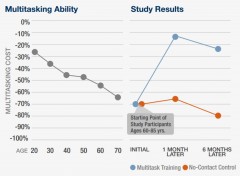Video Game Improves Multitasking Skills
 Does multitasking seem to be getting tougher for you as the years pass? In fact, that’s quite normal. By the time you are 40, multitasking is nearly twice as challenging as when you were 20. The good news is that playing a video game has just been shown to improve cognitive function and, in particular, multitasking ability in healthy older adults. Adults subjects from 60 to 85 years old became as effective at multitasking as 20 year-olds after just a month of training, according to a new UCSF study.
Does multitasking seem to be getting tougher for you as the years pass? In fact, that’s quite normal. By the time you are 40, multitasking is nearly twice as challenging as when you were 20. The good news is that playing a video game has just been shown to improve cognitive function and, in particular, multitasking ability in healthy older adults. Adults subjects from 60 to 85 years old became as effective at multitasking as 20 year-olds after just a month of training, according to a new UCSF study.
 While brain training games are being offered by commercial firms, there has been criticism of the research backing up some of the offerings. The new study was published in Nature, which should blunt some of the inevitable skepticism. The game used in the test was a 3D racing game, NeuroRacer, developed specifically for the project. Players have to drive a car around a winding track while watching for specific road signs, taking action only when they see specific signs.
While brain training games are being offered by commercial firms, there has been criticism of the research backing up some of the offerings. The new study was published in Nature, which should blunt some of the inevitable skepticism. The game used in the test was a 3D racing game, NeuroRacer, developed specifically for the project. Players have to drive a car around a winding track while watching for specific road signs, taking action only when they see specific signs.
Working memory and sustained attention were also improved by playing the game.
Gazzaley is a founding board member of Akili Interactive Labs, a firm which says it employs “cutting-edge neuroscience insights, rigorous clinical validation and state-of-the-art game mechanics” to develop brain training games.
This is quite a remarkable result, and it will be interesting to see if younger age categories can also experience improvements in multitasking from this or other games. Looking at the chart of “normal” decline, it’s easy to imagine many middle-aged people striving to return to peak multi-tasking performance.
